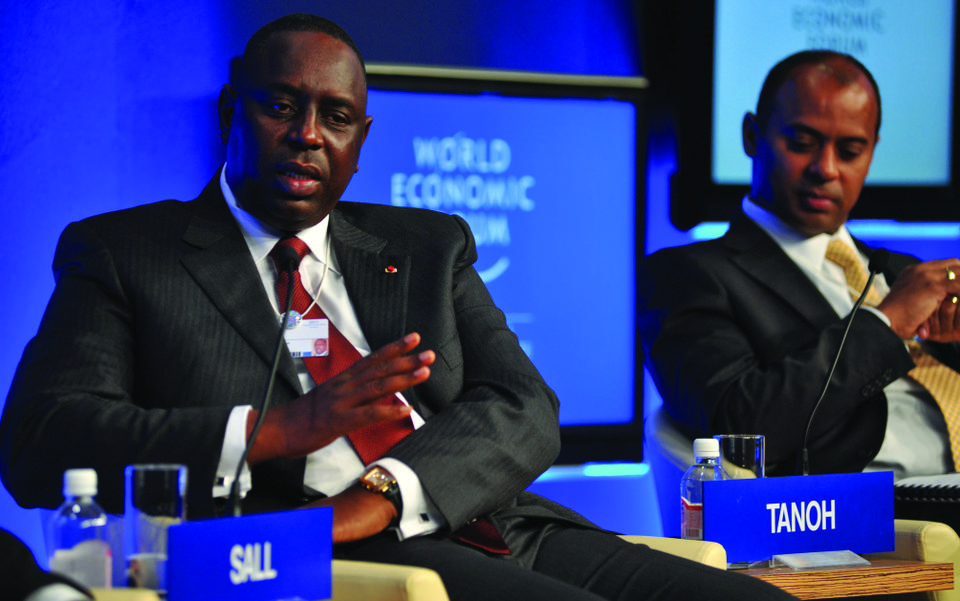
News
Progressive Labor Party Organizes Solidarity March With Harvard Yard Encampment

News
Encampment Protesters Briefly Raise 3 Palestinian Flags Over Harvard Yard

News
Mayor Wu Cancels Harvard Event After Affinity Groups Withdraw Over Emerson Encampment Police Response

News
Harvard Yard To Remain Indefinitely Closed Amid Encampment

News
HUPD Chief Says Harvard Yard Encampment is Peaceful, Defends Students’ Right to Protest
President of Senegal Presents Ideas for Nation's Development

Macky Sall, president of Senegal, delivered the keynote address of the fourth annual Harvard African Development Conference on Friday afternoon. The conference, titled “Visible Change in Africa: One Innovation at a Time”, was organized by seven Harvard schools and lasted through Saturday night.
Sall—who rose from civil servant to president in a little more than a decade—discussed democratic ideals and the developmental challenges that Senegal and the African continent face.
“We must lay down the weapons,” Sall said of Africa. “We must put aside what divides us and continue to talk about what unites us.”
Sall, who spoke through a translator for much of the event, said the primary objectives the continent and Senegal must strive to achieve include improving the design of political institutions, guaranteeing social justice, and upgrading Senegal’s economic status to that of a middle-income nation.
Likening Africa to Asia, he expressed his desire for the entire continent to emerge as an “African tiger.” Accomplishing this, Sall said, would require foreign countries and groups to cease giving handouts and instead invest in Africa, which he referred to as “the next frontier after Asia.”
Since coming into power in 2012, Sall has sought to bolster the democratic process in a west African nation that has been beleaguered by a 50 percent poverty rate and a per capita income of only $2000.
To raise the standard of living, his government is in the process of developing a “Senegalese New Deal,” which includes improved access to basic health care, reduction in payroll taxes, and a new welfare program.
“[The Senegalese New Deal] is also a necessary condition for peace and stability,” Sall said. “All too often, extreme poverty leads to revolts and extremism.”
After these steps, Sall said that he hopes to “go beyond eradicating poverty, to create durable wealth and prosperity for our people in a peaceful, regional context.”
He also encouraged members of the African diaspora to return to their native lands, but first “accept in your head already to go back to your country and serve in the real conditions of your country.”
At the end of Friday’s address, Sall answered questions from audience members. When asked about his plans for the gay community of Senegal—where homosexuality is a criminal offense—he said that though he was a “strong proponent of minority rights”, the government should not “impose certain viewpoints [on] society.”
Sall was welcomed by a conference coordinator, Harvard Kennedy School student and Lowell house tutor Layusa Isa-Odidi ’09.
“Four years ago, we began an experiment: the African Development Conference,” she said, “We really wanted to increase the visibility of the African continent at Harvard.”
Sall came into power after facing adversary in Senegal. In 2008, Sall was ousted from Senegalese politics by his predecessor for demanding improved transparency in the executive branch. He went on to found his own party, the Alliance for the Republic, and was elected president in 2012 in a free and peaceful election validated and praised by western observers.
Prior to his election, his opponent—the incumbent president—amended the Senegalese constitution, increasing the number of presidential terms legally permitted from two to three. Sall, elected to a seven-year term, has since reduced term-length to five years, effective beginning with his own presidency.
—Staff writer Steven R. Watros can be reached at watros@college.harvard.edu. Follow him on Twitter @SteveWatros
Want to keep up with breaking news? Subscribe to our email newsletter.
